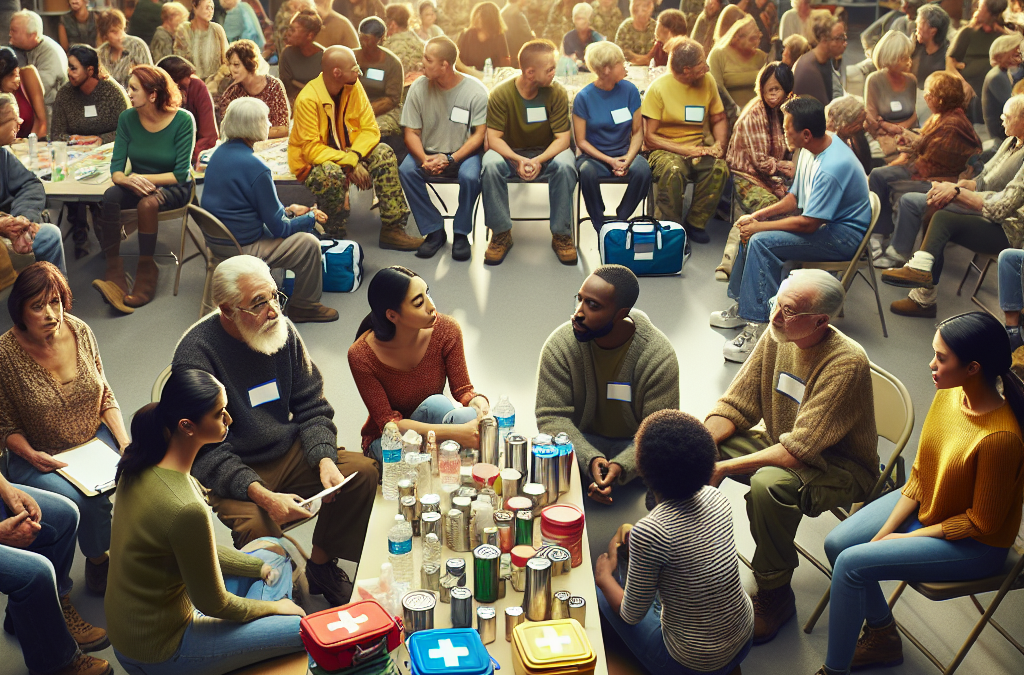Community Organizations and Local Groups
Finding Your Local Preparedness Groups
One of the best places to start is by checking out community organizations focused on disaster preparedness. I remember when I first got into this, I stumbled upon a local group that meets monthly. They’re passionate about educating the community on risks and planning ahead. These groups often post their events on community boards, social media, or even websites dedicated to local activities. Getting involved can make a real difference!
Be sure to reach out to local nonprofits. Some are specifically dedicated to disaster preparedness. They often offer training sessions and workshops that not only inform you but allow you to meet like-minded individuals. It’s a perfect way to share experiences and resources. Plus, you get to learn from folks who have dealt with emergencies firsthand.
Sometimes, you can even find volunteer opportunities within these organizations. Taking action not only boosts your skills but also helps you forge stronger connections with others who care about disaster preparation. Trust me, it’s rewarding to be part of something bigger than yourself.
Online Forums and Social Media Groups
Utilizing Social Media for Connections
In this digital age, online forums and social media are gold mines for connecting with others interested in disaster preparedness. Platforms like Facebook and Reddit have numerous groups dedicated to this cause. I’ve made some great connections just by joining a few of these communities and engaging in discussions about best practices and experiences.
Don’t shy away from participating in these conversations! Ask questions, share your own tips, and learn from others. I once posted about an emergency kit I was assembling, and the feedback and suggestions I received were incredible. People love to help, and you’ll find loads of generous folks offering their insights.
Moreover, attending virtual events or webinars hosted by these online communities is another fantastic way to connect. You’ll often find experts sharing their knowledge, and it’s a fantastic opportunity to network with attendees as well. It’s all about being proactive and putting yourself out there.
Thank you for reading this post, don't forget to subscribe NOW for FREE!
Workshops and Training Sessions
Enrolling in Local Workshops
Another hands-on way to connect with others is through workshops. Many organizations hold training sessions on various aspects of disaster preparedness, from first aid to emergency planning. When I attended a local workshop that involved creating an emergency plan, I realized how beneficial it was to interact with others in a learning environment.
These workshops not only equip you with valuable skills but also create a sense of camaraderie among participants. You’re all there for the same reason: to be better prepared for the unforeseen. I met several people who have since become friends, and we often exchange ideas on how to improve our preparedness efforts.
Keep an eye out for certifications, too! Some places offer official training that could enhance your personal resume while connecting with others on the same path. It’s both fulfilling and instrumental in building a network of preparedness-minded individuals.
Neighborhood Associations and Community Plans
Engaging with Your Neighbors
Don’t underestimate the power of your immediate surroundings! Neighborhood associations are often key players in disaster preparedness efforts. I started attending my local meetings, which led to discussions on safety and emergency plans tailored specifically to our area. Engaging with your neighbors builds a foundation of trust and mutual support.
It’s a great way to get a pulse on what resources are available in your community. Some neighborhoods even set up brigades for emergencies, which means you’ll know exactly who can help in a crisis. The feeling of knowing that you’re all on the same team is comforting.
Plus, you can collaborate on community-wide drills and create a neighborhood emergency response plan. It’s empowering to feel like you’re not just preparing personally, but building a resilient community. It turns something daunting into a group effort – and that’s pretty special.
Emergency Services and Government Programs
Building Relationships with Local Services
Lastly, connecting with emergency services can be a huge asset. Fire departments, police, and local emergency management offices often offer workshops and resources for the public. I attended a session hosted by our fire department that not only provided valuable information but also allowed me to meet local responders.
These services are not just there when disaster strikes; they want to promote preparedness in the community too! Establishing a connection with them can provide you with additional support and resources that you might not find elsewhere.
Furthermore, local governments often have programs aimed at improving community resilience. Stay updated on what they offer; they might share your interest in having a well-prepared community and provide tools and initiatives that can further enhance your preparation efforts.
FAQs
1. Why is connecting with others important for disaster preparedness?
Connecting with others allows you to share resources, experiences, and tips, making your preparedness efforts more effective. It also creates a support system that can be crucial during emergencies.
2. Where can I find local preparedness groups?
Check community bulletin boards, social media platforms, and local nonprofit organizations. Often, these groups will hold regular meetings and events that anyone can join.
3. How do online forums and social media help in preparing for disasters?
They provide a space for discussion and sharing of best practices. You can connect with experts and peers who can offer insights and advice tailored to your situation.
4. Are workshops really beneficial for disaster preparedness?
Absolutely! Workshops provide you with practical skills and knowledge while also giving you a chance to meet others who are equally invested in being prepared.
5. How can I involve my neighbors in disaster preparedness?
Start by discussing the importance of preparedness in your neighborhood associations or simply through casual conversations. You can organize meetings, share resources, or even practice drills together!






